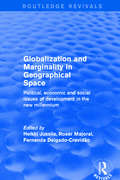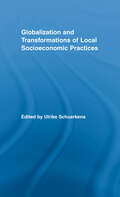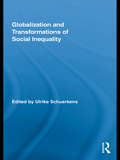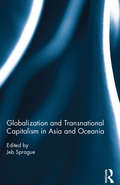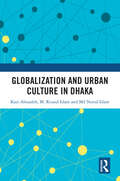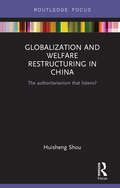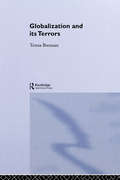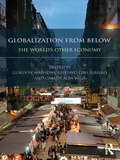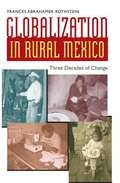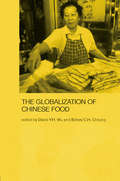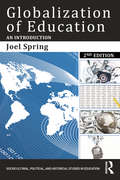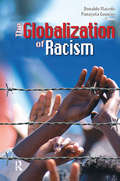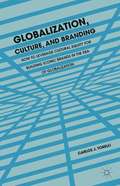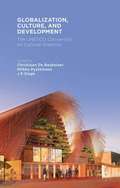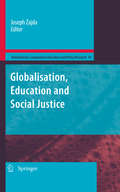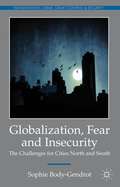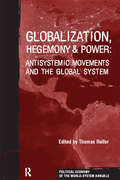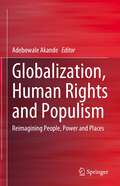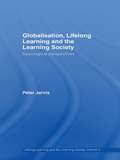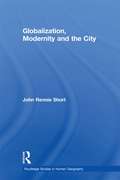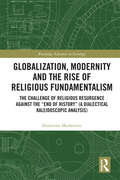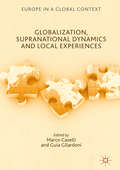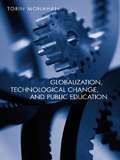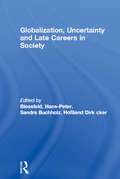- Table View
- List View
Globalization and Marginality in Geographical Space: Political, Economic and Social Issues of Development at the Dawn of New Millennium
by Heikki Jussila, Roser Majoral, Fernando Delgado-CravidãoThis title was first published in 2001. An examination of globalization and marginality in geographical space, it discusses the issue of marginalization and the effects that economic globalization have on marginal and critical regions from the point of view of politics and policies and the shift from economic to social issues of development.
Globalization and Networked Societies: Urban Regional Change in Pacific Asia
by Yue-Man YeungGlobalization, along with globalism, continues its unrelenting and accelerating march as it draws more countries, cities, and people closer into interdependent relationships. Globalization and Networked Societies attempts to tease out some of the salient elements of this process, especially as it has affected urban centers in Pacific Asia over the past twenty years.
Globalization and Transformations of Local Socioeconomic Practices (Routledge Advances in Sociology)
by Ulrike SchuerkensThis innovative volume provides a comprehensive overview of the transformation of socio-economic practices in the global economy. The contributors offer analytical and comparative insights at the world level, with regard to the current socio-economic practices as well as an assessment of the overall economic globalization phenomenon in the global world. Through empirical case studies of different civilizations or cultures that describe situations of intertwining of local socio-economic practices and global economic modernity, this volume assesses the overall situation in the world, looking at the world as an economic system where some countries act as winners, others as losers and some as both winners and losers of economic globalization. This exceptional book will appeal to sociologists, social and cultural anthropologists, and economists interested in development.
Globalization and Transformations of Social Inequality (Routledge Advances in Sociology)
by Ulrike SchuerkensSocial inequality is a worldwide phenomenon. Globalization has exacerbated and alleviated inequality over the past twenty-five years. This volume offers analytical and comparative insights from current case studies of social inequality in more than ten countries within all the major regions of the world. Contributors provide an assessment of the overall social globalization phenomenon in the global world as well as an outlook of transformations of global social inequality in the future. This book will be a timely addition for students and scholars of globalization studies, social inequality, sociology, and cultural and social anthropology.
Globalization and Transnational Capitalism in Asia and Oceania
by Jeb SpragueNews headlines warn of rivalries and competing nations across Asia and the Pacific, even as powerful new cross-border relations form as never before. This book looks behind the Asia-Pacific curtain: at the new forms of social, economic, and political integration taking place through a global capitalism that is rife with contradictions, inequality, and crisis. We are moved beyond traditional conceptualizations of the inter-state system with its nation-state competition as the core organizing principle of world capitalism and the principal institutional framework that shapes the makeup of global social forces. These important studies examine and debate over how there is a growing transnationality of material (economic) relations in the global era, as well as an emerging transnationality of many social and class relations. How does transnational capitalist class fractions, new middle strata, and labor undergird globalization in Asia and Oceania? How have states and institutions become entwined with such processes? This book provides insight into a field of dynamic change.
Globalization and Urban Culture in Dhaka
by M. Rezaul Islam Kazi Abusaleh Md. Nurul IslamThis book examines globalization and urban cultures in Dhaka, the capital of Bangladesh, from a socio-cultural view. It focuses on the evolving nature of urbanity in the city due to globalization and the global flow of information while framing the changing patterns of everyday cultures and practices. The volume explores key linkages and factors in urban transformation: the history and heritage of Old Dhaka; globalization, diverse urban cultures and ethnic spaces; changes in food habits, clothing, health practices and recreation; changing forms of festivals, marriages and religious practices; situation of indigenous people in Old Dhaka; and the role played by NGOs, civil society and the local government. With its rich ethnographic case studies and field-based evidence, it discusses the relations between technology-driven economic activities and increasing cultural homogenization. It traces developments induced by cultural globalization and includes contemporary debates along with comparisons of Asian and global perspectives. This book will be a useful resource for scholars and researchers of urban studies, city studies, urban sociology, social anthropology, cultural anthropology, political sociology, development studies, South Asian studies and cultural studies, and to those interested in Bangladesh.
Globalization and Welfare Restructuring in China: The Authoritarianism That Listens? (Routledge Contemporary China Series)
by Huisheng ShouIn the past few decades, the change in China’s welfare system has been characterised by a balanced distribution of benefits across social sectors and the institutionalization of welfare redistribution. This process has occurred without significant political change that would empower politically disadvantaged groups such as the urban and rural poor. This book questions what has motivated the regime to redistribute welfare benefits through an institutionalized manner whilst its political structure remains largely unchanged. By situating China within the broader context of East Asia and against the backdrop of globalization since the 1980s, this book examines the institutional origin and development of China’s new welfare system. Through doing this, it provides an understanding of the nature of the Chinese state in dealing with its economy and society in a context of global economic integration. A global-local dynamics framework highlights the importance of the interactive relationship between China’s integration into the world economy and its unique geopolitical constraints, which together induce the regime to listen to its subjects and follow a "move to the middle" in welfare restructuring. Offering a novel explanation of the welfare-globalization relations in a non-democratic setting, this book will be of interest to students and scholars of Social Policy, International Political Economy and Chinese Politics.
Globalization and its Terrors
by Teresa BrennanIt has long been realised that the poorer countries of the south have paid for the unstoppable onward rush of globalisation in the exploitation of their natural and human resources. Recent events have made it clear that there may be a price to be paid in the west as well.In this elegant, lucidly argued account, Teresa Brennan argues that the evidence already exists that globalisation has for years been harming not just the poor of the third world but also its alleged beneficiaries in the affluent west. She shows how the speeding-up of contemporary capitalism, in which space is substituted for time, means that neither then environment nor the people who live in it are given the opportunity to regenerate and how this leads directly to pollution-induced, immune-deficient and stress-related disease. In a final chapter she suggests some alternative ways forward through a return to regionally based production and an emphasis on local economies.
Globalization from Below: The World's Other Economy
by Gordon Mathews Gustavo Lins Ribeiro Carlos Alba VegaThis book explores globalization as actually experienced by most of the world’s people, buying goods from street vendors brought by traders moving past borders and across continents under the radar of the law. The dimensions and practices of ‘globalization from below’ are depicted and analyzed in detail by a team of international scholars. Topics covered include the ‘New Silk Road’, African traders in China, street hawking in Calcutta and pirate CDs in Mexico. The chapters provide intimate portrayals of routes, markets and people in locations across the globe and explore theories that can help make sense of these complex and fascinating case studies. Students of globalization, economic anthropology and developing-world economics will find the book invaluable.
Globalization in Rural Mexico: Three Decades of Change
by Frances Abrahamer RothsteinWhen the ever-intensifying global marketplace "modernizes" rural communities, who stands to gain? Can local residents most impacted by changes to their social fabric ever recover or even identify what has been lost?<P><P>Frances Abrahamer Rothstein uses thirty years of sustained anthropological fieldwork in the rural Mexican community of San Cosme Mazatecochco to showcase globalization's complexities and contradictions. <P> Rothstein's lucid work chronicles the changes in production, consumption, and social relations during three distinct periods: the Mexican "miracle," when economic development fueled mobility for a large segment of the population, including San Cosme's worker-peasants; the lost decade of the 1980s, when much of what had been gained was lost; and the recent period of trade liberalization and globalization, considered by many in Mexico and beyond as a panacea and a disaster at the same time.
Globalization of Chinese Food (Anthropology Of Asia Ser.)
by David Y. H. Wu Sidney C. H. CheungDoes Chinese food taste the same in different parts of the world? What has happened to the Chinese diet in mainland China, Taiwan, Hong Kong and Macau? What has affected the foodways of Chinese communities in other Asian countries with large Chinese diasporic communities? What has made Chinese food popular in Australia, Indonesia, the Philippines and Japan? What has brought about the adoption and adaptation of western food and changes in Chinese diets in Hong Kong, Taiwan and Peking? By considering the practice of globalization, this volume of essays by well-known anthropologists from many locales in Asia, describes changes, variations and innovations to Chinese food in many parts of the world, paying particular attention to questions related to how foods are introduced, maintained, localised and reinvented according to changing lifestyles and social tastes. The book reviews and broadens classic social science theories about ethnic and social identity formation through the examination of Chinese food and eating habits in many locations. It reveals surprising changes and provides a powerful testimony to the impact of late twentieth-century globalization.
Globalization of Education: An Introduction (Sociocultural, Political, and Historical Studies in Education)
by Joel SpringContinuing Joel Spring’s reportage and analysis of the intersection of global forces and education, this text offers a comprehensive overview and synthesis of current research, theories, and models related to the topic. Written in his signature clear, narrative style, Spring introduces the processes, institutions, and forces by which schooling has been globalized and examines the impact of these forces on schooling in local contexts. Significant conceptual frameworks are added to this Second Edition, specifically the “economization of education,” “corporatization of education” and the “audit state.” These concepts are embedded in the global educational plans of major organizations such as the World Bank, the Organization for Economic Development and Cooperation (OECD), World Economic Forum, and multinational corporations. Globalization of Education, Second Edition features new and updated information on • The World Bank• OECD and the United Nations• The World Trade Organization and the Global Culture of Higher Education• Corporatization of Global Education• Religious and Indigenous Education Models• The Global Workforce: Migration and the Talent Auction• Globalization and Complex Thought
Globalization of Racism (Series in Critical Narrative)
by Donaldo Macedo Panayota GounariAddressing ethnic cleansing, culture wars, human sufferings, terrorism, immigration, and intensified xenophobia, "The Globalization of Racism" explains why it is vital that we gain a nuanced understanding of how ideology underlies all social, cultural, and political discourse and racist actions. The book looks at recent developments in France, Germany, Greece, Ireland, Israel, Italy, Portugal, Spain and the United States and uses examples from the mass media, popular culture, and politics to address the challenges these and other countries face in their democratic institutions. The eminent authors of this important book show how we can educate for critical citizenry in the ever-increasing multicultural and multiracial world of the twenty-first century. Contributors are: David Theo Goldberg, Loic Wacquant, Edward W. Said, Zygmunt Bauman, Peter Mayo and Carmel Borg, Anna Aluffi Pentini and Walter Lorenz, Peter Gstettner, Georgios Tsiakalos, Franz Hamburger, Julio Vargas, Lena de Botton and Ramon Flecha, Concetta Sirna, Jan Fiola, Joao Paraskeva, Henry A. Giroux. It explores new forms of racism in the era of globalization.
Globalization, Culture, and Branding
by Carlos J. TorelliDrawing from novel theoretical insights in social psychology, cultural psychology, and marketing, Globalization, Culture and Branding provides guidelines for imbuing brands with culturally symbolic meanings that can create deep psychological bonds with multi-cultural consumers.
Globalization, Culture, and Development
by J. P. Singh Christiaan De Beukelaer Miikka Pyykk�nenThis edited collection outlines the accomplishments, shortcomings, and future policy prospects of the 2005 UNESCO Convention on the Protection and Promotion of the Diversity of Cultural Expressions, arguing that the Convention is not broad enough to confront the challenges concerning human rights, sustainability, and cultural diversity as a whole.
Globalization, Education and Social Justice
by Joseph ZajdaGlobalization, Education and Social Justice, which is the tenth volume in the 12-volume book series Globalisation, Comparative Education and Policy Research, presents up-to-date scholarly research on major discourses concerning global trends in education, social justice and policy research. It provides an easily accessible, practical yet scholarly source of information about the international concern in the field of social justice, globalisation, and policy research. Above all, the book offers the latest findings to the critical issues in education and social justice globally. It is a sourcebook of ideas for researchers, practitioners and policy makers in education, globalisation and social justice education reforms around the world. It offers a timely overview of current issues in social justice affecting education policy research in the global culture. It provides directions in education, and policy research, relevant to transformational educational reforms in the 21st century. The book critically examines the overall interplay between globalisation, education reforms, and social justice. It draws upon recent studies in the areas of globalisation, social justice education reforms and the role of the State. It explores conceptual frameworks and methodological approaches applicable in the research covering the State, globalisation, equity, education, and social justice. It demonstrates the neo-liberal ideological imperatives of education and policy reforms, and illustrates the way the relationship between the State and education policy affects current models and trends in education reforms for social justice and schooling globally. Various book chapters critique the dominant discourses and debates pertaining to the politics of social justice and education globally and the newly constructed and re-invented models of neo-liberal ideology in education and policy reforms. Using a number of diverse paradigms in comparative education research, ranging from critical theory to post-structuralist discourses, the authors, by focusing on globalisation, social justice and democracy, attempt to examine critically both the reasons and outcomes of education reforms and policy change for social justice. The volume offers a more informed critique on the Western-driven models of education reforms and implications for social justice. The book also draws upon recent studies in the areas of equity, cultural capital and dominant ideologies in education. The general intention is to make Globalization, Education and Social Justice available to a broad spectrum of users among policy-makers, academics, graduate students, education policy researchers, administrators, and practitioners in the education and related professions.
Globalization, Fear and Insecurity
by Sophie Body-GendrotFear is ingrained in the history of cities but our short-sightedness prevents us from grasping its evolution over time. Increasingly, risk and fear are experienced, portrayed and discussed as globalized phenomena, particularly since 9/11. This research puts urban insecurity in perspective, with a comparison of world cities in the North and South.
Globalization, Hegemony and Power: Antisystemic Movements and the Global System (Political Economy of the World-System Annuals)
by Thomas ReiferThis book explores the closely related dynamics of globalization, hegemony and resistance movements in the modern world. Complimented by dramatic explorations of the new trans-border resistance movements, from the contemporary labor movement to the resurgence of nationalism, this book moves beyond the traditional focus on cycles of rise and decline of great powers to asses the pressing questions at the intersection of contemporary globalizations and hegemonic rise, decline and resurgence of civilizations. Moreover, the book provides a compelling analysis of the role of contemporary globalization in the resurgence of Islamic activism across the globe and the challenges this poses for traditional theories of modernity and global social movements. Contributors: Immanuel Wallerstein, Joachim Rennstich, William Robinson, Jeffrey Kentor, AMy Holmes, Kathleen Schwartzman, Edna Bonacich, Terry Boswell, Paul M. Lubeck & Thomas Reifer, Lauren Langman & Douglas Morris.
Globalization, Human Rights and Populism: Reimagining People, Power and Places
by Adebowale AkandeThis book offers a comprehensive and multidisciplinary global overview of populism and human rights in the light of globalization. It examines why the dominant (neo)liberal paradigm of the last decades resulted in major economic and social inequalities which resulted in the surge of national populism, led by the election success of right-wing parties, movements, and leaders across the world. It discusses, among other topics, the success of Brexit in Britain and the election success of Donald Trump and Marine Le Pen and explains why there is a need for a dialogue on human rights and globalization in this era of populism.Further contributions analyze various important topics of the field, including cross-culturalism, globalization, human rights, challenges and threats, diversity, curbing global corruption, sustainable development, populism, the decline of free speech, the new nationalism, internationalization, global regime of human rights, leadership theory, global management competencies, gender, quality management, individualism-collectivism, and examples of new initiatives in global organizations. This makes the book a valuable and useful resource for students, researchers, and scholars of international relations, political science, sociology, political psychology, law, diplomatic studies, Communication and media studies, economics, education and management, as well as practitioners and policy-makers interested in a better understanding of globalization, populism, and human rights.
Globalization, Lifelong Learning and the Learning Society: Sociological Perspectives (Lifelong Learning and the Learning Society)
by Peter JarvisThis book critically assesses the learning that is required and provided within a learning society and gives a detailed sociological analysis of the emerging role of lifelong learning with examples from around the globe. Divided into three clear parts the book: looks at the development of the knowledge economy provides a critique of lifelong learning and the learning society focuses on the changing nature of research in the learning society. The author, well-known and highly respected in this field, examines how lifelong learning and the learning society have become social phenomena across the globe. He argues that the driving forces of globalisation are radically changing lifelong learning and shows that adult education/learning only gained mainstream status because of these global changes and as learning became more work orientated.
Globalization, Modernity and the City (Routledge Studies in Human Geography)
by John Rennie ShortWe live in a world of big cities. Urbanization, globalization and modernization have received considerable attention but rarely are the connections and relations between them the subjects of similar attention. Cities are an integral part of the network of globalization and important sites of modernization. Globalization, Modernity and The City weaves together broad social themes with detailed urban analysis to explore the connections between the rise of big cities, the creation of a global network and the making of the modern world. It explains the growth of big cities, the urban bias of global flows and the creation of metropolitan modernities. The text develops broad theories of the subtle and complex interactions between urbanization, globalization and modernization in a sweep of the urban experience across the globe. Thematic chapters explore the making of the modern city in profiles of the growth of urban spectaculars, the role of flanerie, the traffic issues of the modernist city, recurring issues of urban utopias and the rise of the primate city. Detailed case studies are drawn from cities in Australia, China and the USA. Urban snapshots of cities such as Atlanta, Barcelona, Istanbul, Mumbai and Seoul provide a truly global coverage. The book links together broad social themes with deep urban analysis. This well-written, accessible and illustrated text will appeal to the broad audience of all those interested in the urban present and the metropolitan future.
Globalization, Modernity and the Rise of Religious Fundamentalism: The Challenge of Religious Resurgence against the “End of History” (A Dialectical Kaleidoscopic Analysis) (Routledge Advances in Sociology)
by Dimitrios MethenitisThe emergence of religious fundamentalism in a globalized, post-colonial world poses a significant challenge to the "End of History" narratives common in academic and non-academic literature alike. Globalization, Modernity and the Rise of Religious Fundamentalism proposes that we must seek new explanations for this phenomenon that recasts the relationship between globalization, modernity and religion. One model through which this possible is that of a dialectical kaleidoscopic methodology – one that applies a variety of theoretical tools and takes a truly multi-dimensional perspective. Through the overlapping and complementary approaches of systems theory, field theory and network theory, this book redefined the concepts of globalization, modernity and religion itself by challenging the inherent misconceptions of ethnocentric biases. It also provides a thorough historical analysis of religious systems from antiquity to the present to show the integration of modern and archaic elements within the structure of religious fundamentalism. Interdisciplinary in nature, Globalization, Modernity and the Rise of Religious Fundamentalism will appeal to students and researchers interested in fields such as geopolitics, history of race and ethnicity, postcolonialism, globalization and sociology of religion.
Globalization, Supranational Dynamics and Local Experiences (Europe in a Global Context)
by Marco Caselli Guia GilardoniThis edited collection focuses on concepts of globalization, glocalization, transnationalism and cosmopolitanism. The contributions provide evidence of how in practice, global dynamics and individual lives are interrelated. It presents theoretical reflections on how the local, the transnational and global dimensions of social life are entwined and construct the meaning of one another, and offers everyday examples of how individuals and organizations try to answer global challenges in local contexts. The book closely focuses on migration processes, as one of the main phenomena allowing a high number of people from contemporary society to directly experience supranational dynamics, either as migrants or inhabitants of the places where migrants pass through or settle down. Globalization, Supranational Dynamics and Local Experiences will be of interest to students and scholars across a range of disciplines, including sociology, migration studies and global studies.
Globalization, Technological Change, and Public Education
by Torin MonahanGlobalization, Technological Change, and Public Education documents the dramatic changes taking place in public education through the incorporation of new information technologies. These additions to the public school environment have generally been seen as enabling tools to help students and nations compete in the global marketplace. Yet a closer look at the interplay of technological change and organizational restructuring suggests the emergence of new, less promising power relations. Through detailed ethnographic research and interviews in the Los Angeles public school system, Torin Monahan reveals how, with few exceptions, these changes to the educational process are forcing both students and workers to adapt to systems that are ever more rigid and controlling.
Globalization, Uncertainty and Late Careers in Society (Routledge Advances in Sociology)
by Dirk Hofäcker Hans-Peter Blossfeld Sandra BuchholzGlobalization has been strongly shaping and transforming both national economies and individual careers in recent decades. These profound changes have had significant consequences for individual careers of men and women both during and after their employment career. This impressive new collection focuses on the effects of the globalization process on late-midlife workers and the exit from employment – a relationship that has up to now mostly been neglected in social science literature on aging and employment. The research documented within these pages poses several important questions: * Has globalization produced fundamental shifts in late-midlife workers’ labor market participation and late careers? * What transformations in old age career mobility can we observe? * How are these transformations filtered by different national institutional settings? With an impressive array of contributions, this volume will interest students and academics involved in the study of sociology, welfare and globalization.
